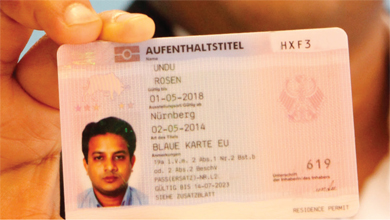This content is also available in
Mobility in the European Union
The Schengen States are:

Austria, Belgium, Bulgaria, Croatia, the Czech Republic, Denmark, Estonia, Finland, France, Germany, Greece, Hungary, Iceland, Italy, Latvia, Liechtenstein, Lithuania, Luxembourg, Malta, the Netherlands, Norway, Poland, Portugal, Romania, Slovakia, Slovenia, Spain, Sweden and Switzerland.
Lawful residence in one Member State of the EU gives rise to an entitlement to also enter and stay in other EU Member States, subject to specific prerequisites. This possibility of mobility between different European countries makes the European Union and Germany particularly attractive destinations for immigrants. Factors to be considered here are the intended duration of stay and whether employment is to be taken up.
If you are a third-country national and hold a residence title from a Schengen State, you may stay in another EU State for up to 90 days if you do not take up gainful employment there. The same applies if you are exempted from the visa requirement for a short stay in the European Union. Your overall stay in the EU must not exceed 90 days in the latter case.
If you are a third-country national and wish to stay in another Member State for more than 90 days, or if you intend to work in another Member State, you will also require a residence permit issued by the EU Member State concerned.
The legal basis

- Section 15 of the Residence Ordinance - Common provisions on short stays
- Section 17 of the Residence Ordinance
- Section 39 Nos. 3 and 6 of the Residence Ordinance - Extension of a stay in Germany for longer-term purposes
- Art. 6 Regulation (EU) 2016/399 - Entry conditions for third-country nationals
- Art. 21 of the Convention implementing the Schengen Agreement - Residence with a residence title issued by a Member State
- Art. 1 of Regulation (EC) no. 539/2001 on the visa requirement and exemption from same







